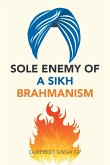Hinweis: Dieser Artikel kann nur an eine deutsche Lieferadresse ausgeliefert werden.
The entire life of the writer Harinder Singh Mehboob, from October 1, 1937, to February 14, 2010, was a rare epical life. As we touch the ocean from anywhere, it is all water; in the same mode that every footprint of the poet was a complete epic from start, middle, and end. Before the partition of India and Pakistan in 1947, which was filled with deep pain, the birth of the writer took place in village Chak no. 233, district Lyallpur in Sandal Bar (an artistic land gifted with primordial grace). This land of Sandal Bar has maintained the period of Adam through the response of "pure nature," its simple and innocent wild people of ancient variety, the old stories of its true lovers who were swooned in their death in love, Punjabi Sufi poets, and through the labor of these true, simple, and innocent people with spontaneous kindness. The poet's village, Chak no. 233, is near the village of Talwandi, which is the birthplace of the first prophet of the Sikh Nation (Khalsa), Guru Nanak Sahib. This place is the meeting point of Semitic prophets, Islam, and also the Indian Avataras, with the collective grace of Indian and Islamic traditions blessed with the wisdom of ancient classical melody. At the time of the birth of the poet Harinder Singh Mehboob, this land flourished with the ancient wisdom of the primordial people known as Janglis. So it was an ancient nest of gentry that maintained the reminiscences of the Garden of Eden. The legends of its lovers, Heer-Ranja, Sasi-Punu, Sohni-Mehiwal, Mirza-Sahiban, and Shirin-Farhad, etc., are, in the words of Earnest Rhys, "like the prophets of the Old Testament, Solomon and Ruth." Harinder Singh Mehboob, in his book of divine poetry Jhana di rat, has glorified their beauty in marvelous variety: Jis de joban jal bal jana Heer na os bunare Rang kasumbha jis than vikda Os ton khari agare. Je na wang ambar the tute Joban Heer da wallan Sanjog-weyog dian watan te Mar riha wad shallan. Heer is not standing upon such parapet which is perishable, the worldly way upon which the decaying things which are fragile (in the hymn of Bhagat) like safflower are valued. She is standing further untouched from its devastating approach. If the bangle of the heaven may not break and tolerate its thunder like vibration of beauty and ecstasy then we may encircle the phantomlike prime of Heer, which is overflowing upon the ways of meeting and separation like the billows of the river Jhanan.








